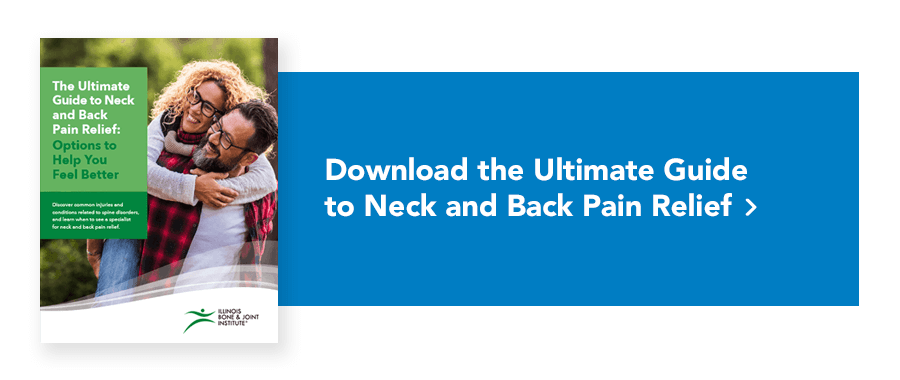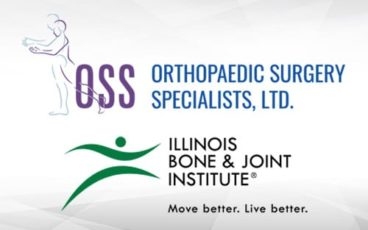Cervical degenerative disc disease can occur as you age, causing pain and stiffness. Over time, our vertebral discs dry out and lose their flexibility, resilience, and shock-absorbing capacity. This dehydration and shrinkage of the center of the disc can quickly lead to degeneration.
Read on to learn more about this condition and the available neck and back pain treatments that can provide relief from symptoms.
Cervical Degenerative Disc Disease Symptoms
The main symptom of cervical degenerative disc disease is persistent neck pain. This pain is usually the result of stiffness from the loss of disc height, which can cause nerve impingement and joint inflammation.
The pain is more prominent when there is head movement or the patient is upright. On the contrary, the pain may ease when lying down or reclining.
When the disc degenerates, it usually indicates the development of bone spurs which cause nerve compression. The entrapped cervical nerve roots can further reduce movement and cause burning, tingling, numbness, and pain in the back of the head and neck, as well as in the arms and hands.
Diagnosing Your Neck Pain
Your physician will likely conduct a physical examination to measure the range of motion and flexibility of the neck. If the physical exam warrants further investigation, tests like an MRI or CT scan may be conducted to figure out if cervical degenerative disc disease is the cause of your neck pain.
A CT scan may identify the impingement on the nerves, and an MRI helps to evaluate the soft tissues of your spine. Lastly, epidural or nerve blocks around neural structures may be necessary to find the source causing the nerve symptoms.
Degenerative Disc Disease Treatment Options
Patients with cervical degenerative disc disease and pain have various treatment options, ranging from physical therapy to surgery.
For acute neck pain, there are different pain management options, including:
- Nonsteroid Anti-Inflammatories (NSAIDs)
- Muscle Relaxants
- Epidural Injections
Your orthopedic specialist may also recommend:
- Doing Physical Therapy
- Wearing a Cervical Collar
- Starting an Interventional Pain Management Program
- Getting Surgical Treatment
Physical Therapy
Physical therapy may include stretching exercises to improve flexibility and extension for relaxing and strengthening the spine’s natural curve. Once the acute pain symptoms subside, generally in two to three weeks, patients are encouraged to start exercising daily. Daily neck stretches and low-impact aerobics may be recommended.
Cervical Collar
A soft cervical collar for support around the neck region may be necessary for several weeks, depending on your cervical degenerative disc disease diagnosis.
Interventional Pain Management
In some cases, an interventional pain management program may be necessary to help reduce your pain. This may include injections of special medications, such as steroids, local anesthetic, or nerve blocks onto or near the nerves in your neck.
Surgical Treatment
If your pain persists after exhausting all non-surgical treatments, your physician may recommend surgery. The most common technique for the treatment of cervical degenerative disc disease is referred to as an anterior cervical discectomy and fusion (ACDF). This procedure involves a frontal approach to remove the affected disc and fuse the adjacent vertebrae.
Spinal fusion surgery is recommended when the patient cannot bear any weight due to painful degenerative discs. This can often accelerate the degeneration of adjacent discs at levels above or below the fusion adversely.
A newer surgical technique can now be utilized to maintain motion in the degenerative level, known as cervical disc replacement, which also decreases the risk of wearing out the disc.
IBJI Can Help Relieve Your Neck Pain
Cervical degenerative disc disease may be a natural part of aging, but you do not have to live with neck pain. With proper diagnosis and treatment, you can make a return to an active and normal lifestyle.
The neck doctors at IBJI can get to the bottom of your neck pain and create a specialized care plan to relieve your symptoms and help you feel better.
Schedule online with an IBJI spine specialist today.
You Might Also Like:
- Alleviate Acute Neck and Back Pain at IBJI’s Back to Life Clinic
- Fit Your Backpack to Avoid Back and Neck Pain
- 5 Common Stiff Neck Causes and How to Treat Them
*This content is for information only and is not intended to replace the diagnosis, treatment, or medical advice from your treating healthcare professionals. The content does not provide medical advice, does not constitute the practice of medicine or other healthcare professional services, and does not create a doctor-patient relationship. You should not rely on this information as a substitute, nor does it replace professional medical advice, diagnosis, or treatment. If you have concerns or questions, seek the advice of your healthcare professionals. If you think you may have a medical emergency, call your doctor or 911 immediately. Do not rely on electronic communications or communicate through this website for immediate, urgent medical needs. This website is not designed to facilitate medical emergencies. The use of the information is at the reader’s own risk. The links are provided for information and convenience only. We cannot accept responsibility for the sites linked or the information found here. A link does not imply an endorsement of a site.





